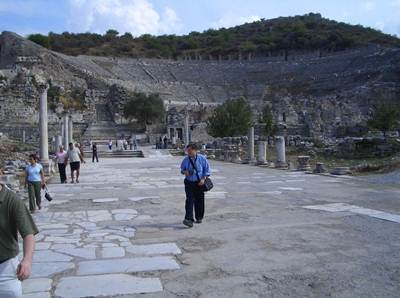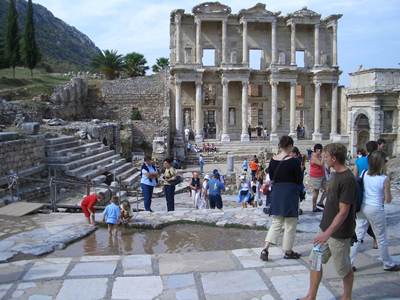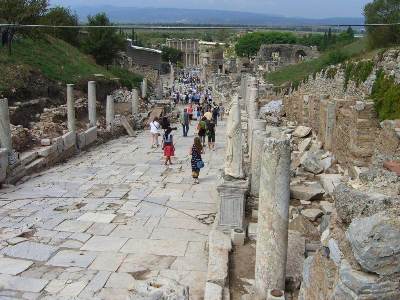What was the history of the church in Ephesus? How is Jesus Christ’s message to the first of the seven churches of Revelation relevant for us today?

Ruins of a small theater along the main street of ancient Ephesus (photo by David Treybig).
As the apostle John received the vision of the Day of the Lord, which he recorded in the book of Revelation, he heard Jesus saying, “‘I am the Alpha and the Omega, the First and the Last,’ and ‘What you see, write in a book and send it to the seven churches which are in Asia: to Ephesus, to Smyrna, to Pergamos, to Thyatira, to Sardis, to Philadelphia, and to Laodicea’” (Revelation 1:11).
As noted in the article “Seven Churches of Revelation,” the order of these cities corresponds to “the route along which a courier from Patmos [where John received the vision] would have carried the scroll” (ESV Study Bible, Revelation 2:11). In this article we will consider the city of Ephesus during the first century, the message the congregation received and the relevance of Christ’s instruction to this congregation for Christians today.
First-century Ephesus
Located near the mouth of the Cayster River and the island of Samos, Ephesus was called “the first and greatest metropolis of Asia” by the Romans. “With an artificial harbor accessible to the largest ships, and rivaling the harbor at Miletus, standing at the entrance of the valley which reaches far into the interior of Asia Minor, and connected by highways with the chief cities of the province, Ephesus was the most easily accessible city in Asia, both by land and sea.
“Its location, therefore, favored its religious, political and commercial development, and presented a most advantageous field for the missionary labors of Paul. The city stood upon the sloping sides and at the base of two hills, Prion and Coressus, commanding a beautiful view; its climate was exceptionally fine, and the soil of the valley was unusually fertile” (International Standard Bible Encyclopedia, 1939, “Ephesus”).
The large theater among the ruins of ancient Ephesus (photo by David Treybig).
Paul then left Priscilla and Aquila in Ephesus while he went to Jerusalem to observe one of God’s holy days. A gifted speaker named Apollos soon came to the city and began to speak accurately and boldly “the things of the Lord” (verses 24-26). Assisted by the husband-wife team of Aquila and Priscilla who gave him a more accurate understanding of God’s way, Apollos “vigorously refuted the Jews publicly, showing from the Scriptures that Jesus is the Christ” (verses 28).
The church of Ephesus
The initial visit by Paul to Ephesus and the powerful preaching of Apollos marked the beginning of the Church of God in Ephesus (called simply the “church of Ephesus” in Revelation 2:1). The next time Paul came through the city, he found that some people, including “about twelve” men, had become disciples (Acts 19:1, 7).
Paul then spent three years in Ephesus (Acts 20:31)—a comparatively long time compared to the lengths of his stays in other areas—preaching the gospel. He began by first speaking in the synagogue and then later teaching daily in the school of Tyrannus “so that all who dwelt in Asia heard the word of the Lord Jesus, both Jews and Greeks” (Acts 19:10).
Several notable events took place in Ephesus. “Now God worked unusual miracles by the hands of Paul, so that even handkerchiefs or aprons were brought from his body to the sick, and the diseases left them and the evil spirits went out of them” (verses 11-12). These miracles and an attack by an evil spirit against someone other than Paul attempting to cast it out created quite a stir.
As the Bible explains, “This became known both to all Jews and Greeks dwelling in Ephesus; and fear fell on them all, and the name of the Lord Jesus was magnified. And many who had believed came confessing and telling their deeds. Also, many of those who had practiced magic brought their books together and burned them in the sight of all. And they counted up the value of them, and it totaled fifty thousand pieces of silver. So the word of the Lord grew mightily and prevailed” (verses 17-20).
The library among the ruins of ancient Ephesus (photo by David Treybig).
Judging by the communication Paul had with these men and their parting, it seems that they had grown quite close to each other. After Paul finished speaking and they had prayed, “they all wept freely, and fell on Paul’s neck and kissed him, sorrowing most of all for the words which he spoke, that they would see his face no more. And they accompanied him to the ship” (Acts 20:37-38).
The Bible reveals that Timothy later served as the pastor of the congregation in Ephesus (1 Timothy 1:1-3). Tradition holds that the apostle John spent many years in Ephesus toward the end of the first century and that this is where he died and was buried.
The message to the church of Ephesus
The admonition to this congregation reads: “To the angel of the church of Ephesus write, ‘These things says He who holds the seven stars in His right hand, who walks in the midst of the seven golden lampstands: “I know your works, your labor, your patience, and that you cannot bear those who are evil. And you have tested those who say they are apostles and are not, and have found them liars; and you have persevered and have patience, and have labored for My name’s sake and have not become weary.
“Nevertheless I have this against you, that you have left your first love. Remember therefore from where you have fallen; repent and do the first works, or else I will come to you quickly and remove your lampstand from its place—unless you repent. But this you have, that you hate the deeds of the Nicolaitans, which I also hate.
“He who has an ear, let him hear what the Spirit says to the churches. To him who overcomes I will give to eat from the tree of life, which is in the midst of the Paradise of God”’” (Revelation 2:1-7).
Analyzing this instruction from Christ, we note that Jesus told the members at Ephesus that He knew their works, patience and attitude toward those who practiced evil—an apparent characteristic of the Nicolaitans. Christ knew that a great work had been done in their city and that they had been an example to all of Asia. He also acknowledged that members of this congregation had seen through the words of false teachers claiming to be apostles and had remained faithful to God.
After praising the church of Ephesus for the good works it had done, Jesus then told them that He had something against them. They had lost their “first love” (verse 4).
First love
The meaning of “first love” in this passage (Revelation 2:4) is the zeal and commitment to God these Christians had when they initially learned of God’s way of life. As the congregation began in Ephesus, it must have been exciting for these members to see the miracles that God performed through Paul and to witness the powerful impact the preaching of the gospel had upon their city and the region. As the scriptural record explains, “all the Jews and Greeks dwelling in Ephesus” heard of these miracles and many burned their books on magic and turned to God (Acts 19:17-20).
The main street among the ruins of ancient Ephesus (photo by David Treybig).
Relevance for today
Concluding His message to the church of Ephesus, Jesus said, “He who has an ear, let him hear what the Spirit says to the churches. To him who overcomes I will give to eat from the tree of life, which is in the midst of the Paradise of God” (Revelation 2:7). In this statement Jesus advises us to heed the messages given to all of the churches so we can be in the Kingdom of God.
This advice to Ephesus remains relevant for us today. We need to maintain our love for God and for others. In John’s words, “In this the children of God and the children of the devil are manifest: Whoever does not practice righteousness is not of God, nor is he who does not love his brother” (1 John 3:10).
How does this message apply to you? Do you have a sincere “love of the truth” so you may be saved (2 Thessalonians 2:10)? Are you sustaining this love or is it waning? Do you truly love others as much as yourself?
To maintain your “first love” for God’s way of life, you need to fellowship with others of like mind if at all possible and you need to practice the spiritual disciplines of Christians: regular prayer, study, meditation and occasional fasting. See the article “The Church: What Is It?” for additional information and feel free to contact us if we may assist you in finding a congregation of the Church of God, a Worldwide Association.





